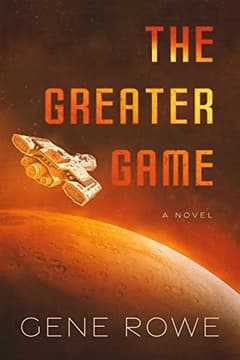
The Greater Game by Gene Rowe
(White Cat Publications, 2022)
Reviewed by Phil Nicholls
In The Greater Game it is 2179 and humanity has begun the process of colonising space. A scattering of planets around distant stars have been colonised, but the bulk of the action revolves around our solar system. Simmering resentments on Mars about their Earth-based colonial controllers sits at the heart of the political machinations driving the plot. Just as the original Great Game was a colonial-era dispute over Afghanistan that ran for most of the 19th Century, so too is Rowe’s book a sprawling political thriller. One faction of the Martian government is plotting with the corporations who have evolved into effective nation-states. Meanwhile a spy and a UN Peacekeeper are both quickly swept up into the intrigue. Rowe weaves a complex, multi-thread narrative in order to encompass the broad scope of his sophisticated plot. What begins as seemingly disparate threads are then steadily pulled together through the course of the book. Once these plot lines begin to unite, the novel steadily picks up speed to a thrilling climax, which changes one part of the setting for good. I admire Rowe’s ambition for the book. The Greater Game delivers a powerful finale as a reward for the slightly disjointed nature of the early sections of the book where the focus jumps from one thread to another. This is a standard SF story structure, which Rowe uses as a vehicle to deliver a strong finish.
As to be expected from this complex story structure, The Greater Game features a broad cast of characters. As the plot jumps around the interstellar setting, we are treated to multiple points of view. These characters include a corporate scientist, a UN soldier and a spy for the Atlantean Union, a transatlantic alliance including the US, UK and a few western European states.
These central characters are presented well, although predominantly male. The assorted supporting cast is more diverse, but at times I would have liked a dedicated cast list to help track the many names. To ease reading the varied threads early the book, Rowe keeps these plots separate by maintaining thematic distinctions. Thus, for example, the corporate scientist is dealing with company affairs and internal politics, while the Atlantean spy follows an espionage plot, and so forth.
Through the course of The Greater Game, these plot threads slowly weave together, just as these central characters gradually unite. This quickens the pace of the book, in time for the Martian schemes to reveal themselves. Rowe manages to deliver a surprising twist to the story, yet still makes the ending satisfying.
Alongside juggling the cast and plot, The Greater Game is written with an exact presentation of the setting. While the book is not heavy with scientific detail, Rowe’s precise description of locations makes the book feel like hard SF. This careful depiction of the setting, especially across multiple story lines, can limit the pacing of the novel in places.
Overall, The Greater Game is enjoyable SF in the style of writers like Heinlein, or Herbert’s Dune. The scope of the setting is limited, in comparison to most space operas, but the plot is on a similar scale for the setting. Human space is changed by the events of The Greater Game and Rowe is to be commended for his dedication to the plot to be willing to present a detailed setting, then significantly change it by the end of the novel.
This is an enjoyable exploration of the early years of humanity’s journey to the stars.
Review from BSFA Review 20 - Download your copy here.
